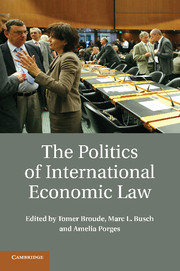Book contents
- Frontmatter
- Contents
- Contributor List
- Acknowledgments
- 1 Introduction
- Part I The Politics of Law Making in International Trade
- 2 The Politics and Indirect Effects of Asymmetrical Bargaining Power in Free Trade Agreements
- 3 The Politics of Linkages in U.S. Preferential Trade Agreements
- 4 The Politics of African Trade Negotiations in the WTO's Doha Round
- 5 The Politics of Legitimacy in the UNCITRAL Working Methods
- Part II The Politics of International Investment Treaty Making
- Part III The Politics of Sovereign Wealth and International Financial Law
- Part IV The Politics of Dispute Settlement in International Economic Law
- Part V Linkages between International Economic Law and Foreign Policy
- Index
2 - The Politics and Indirect Effects of Asymmetrical Bargaining Power in Free Trade Agreements
Published online by Cambridge University Press: 03 May 2011
- Frontmatter
- Contents
- Contributor List
- Acknowledgments
- 1 Introduction
- Part I The Politics of Law Making in International Trade
- 2 The Politics and Indirect Effects of Asymmetrical Bargaining Power in Free Trade Agreements
- 3 The Politics of Linkages in U.S. Preferential Trade Agreements
- 4 The Politics of African Trade Negotiations in the WTO's Doha Round
- 5 The Politics of Legitimacy in the UNCITRAL Working Methods
- Part II The Politics of International Investment Treaty Making
- Part III The Politics of Sovereign Wealth and International Financial Law
- Part IV The Politics of Dispute Settlement in International Economic Law
- Part V Linkages between International Economic Law and Foreign Policy
- Index
Summary
INTRODUCTION
The World Trade Organization (WTO) has been, and continues to be, shaped in its agreements and institutional foci in significant part by political pressures emanating from its members, particularly those able to wield the most influence. Rather than being an institution with the singular focus of achieving free trade among all members, the WTO comprises a complex set of agreements, many of which represent a politically driven compromise among members as to how to manage trade rather than to liberalize it. Although the state of WTO liberalization reflects positions agreed to in part as a result of political realities, the reach of politics is more significant in the context of bilateral trade negotiations. Indeed, what members cannot accomplish through the WTO they may try to achieve through free trade agreements (FTAs), particularly with politically or economically weaker trade partners. In the case of the United States, FTAs have been used as an opportunity to impose provisions favored by domestic constituents – such as strengthened intellectual property provisions and labor and environment clauses – that it has not been able to get WTO members to agree to collectively in the multilateral forum. A similar phenomenon has occurred with respect to the European Union (EU) and its FTA partners. For countries with less bargaining power, the WTO's multilateral setting provides some buffer from power politics in the form of the consensus decision-making practice and the disproportionate number of developing and least-developed countries.
- Type
- Chapter
- Information
- The Politics of International Economic Law , pp. 19 - 39Publisher: Cambridge University PressPrint publication year: 2011
- 6
- Cited by

